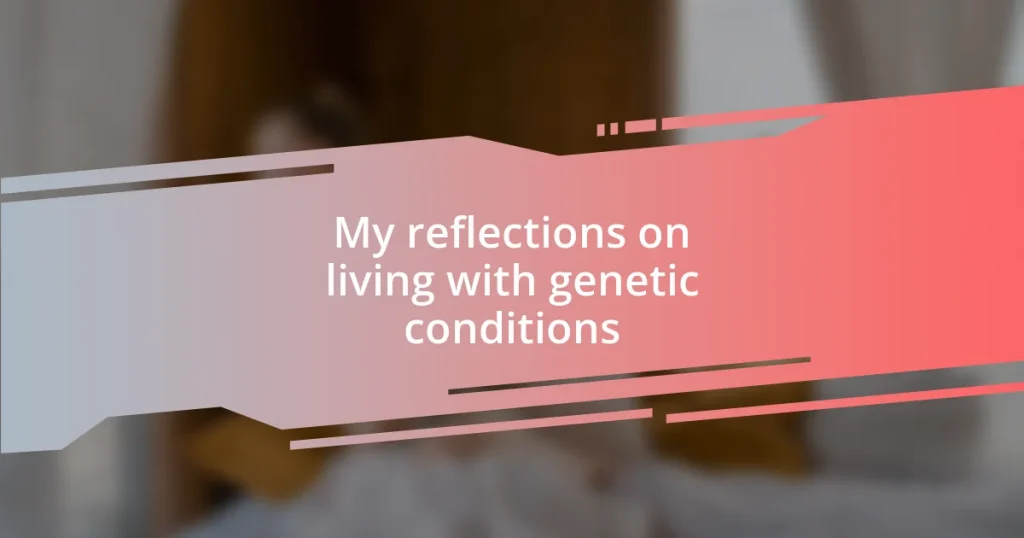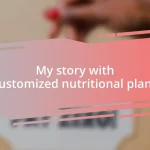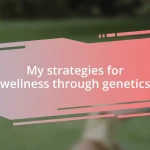Key takeaways:
- Understanding one’s genetic makeup can provide clarity on health risks and familial connections, fostering a deeper self-awareness.
- Building a support network and engaging in open communication are crucial for coping with the emotional and physical challenges of living with a genetic condition.
- Education and advocacy empower individuals to take control of their health and spark broader awareness about genetic conditions, inspiring hope for future advancements in treatment.
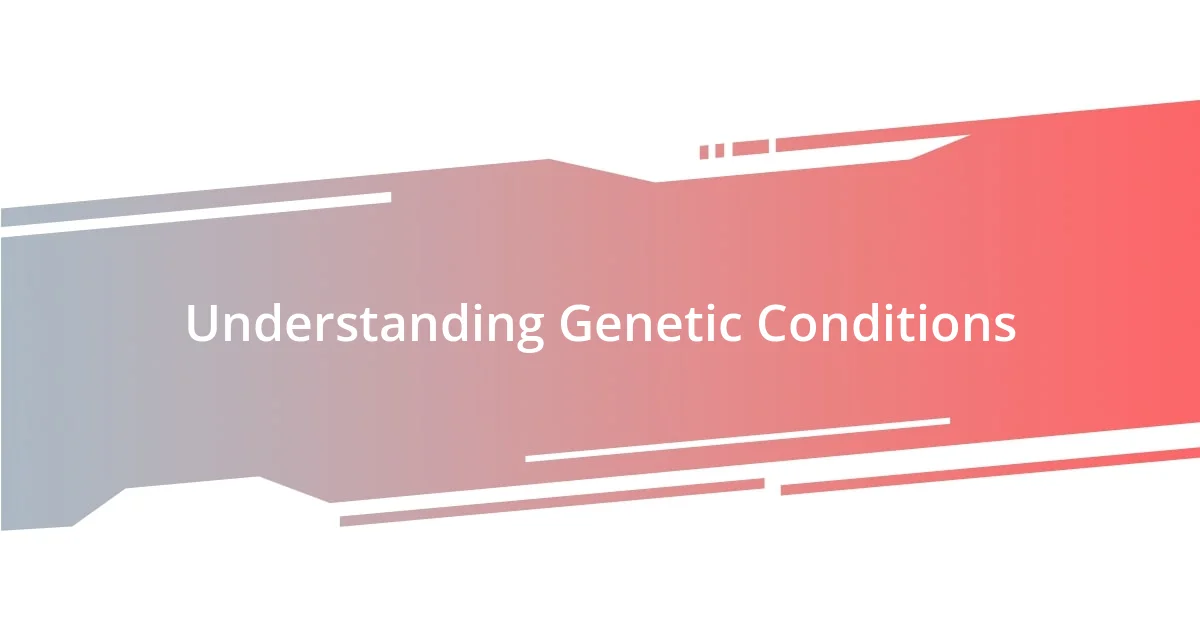
Understanding Genetic Conditions
Genetic conditions arise from abnormalities in our DNA, and it’s fascinating yet sometimes overwhelming to think about how deeply these conditions can influence our lives. For instance, I once learned that a simple mutation in a single gene can lead to a complex array of health issues. It made me wonder how many of us walk around unknowingly carrying the legacy of our genes, and what stories they might tell.
When I first encountered genetic testing, it felt like opening a door to a world that had always been there but was shrouded in mystery. Understanding my own genetic makeup not only informed me of potential health risks but also gave me a sense of clarity about my family’s history. Have you ever thought about how genetics can connect us to our ancestors in ways we hadn’t imagined?
Living with a genetic condition often means navigating a landscape filled with uncertainty and emotional challenges. I remember grappling with my diagnosis and feeling a mix of fear, frustration, and yes, even a bit of relief from finally having answers. This journey makes me reflect on how crucial it is to foster understanding and empathy for those affected by these conditions— after all, isn’t everyone just trying to make sense of their unique story?
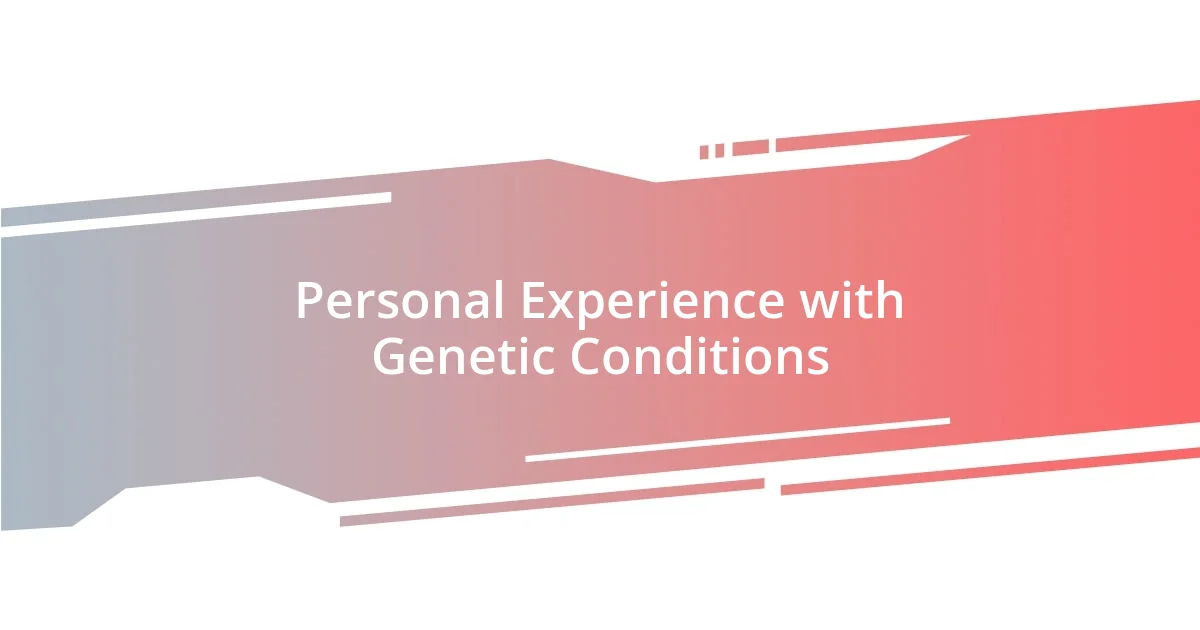
Personal Experience with Genetic Conditions
Living with a genetic condition has certainly shaped my perspective on life. The constant awareness of my unique challenges often feels like carrying a weight that can’t be seen, yet it profoundly influences my day-to-day experiences. I recall a moment in my childhood when I realized I wasn’t like everyone else at school. While my classmates played sports effortlessly, I’d hold back, cautious about overexerting myself. It was a bittersweet realization, blending sadness with admiration for their carefree spirits.
It’s not just the physical aspects; the emotional rollercoaster can be equally exhausting. I’ve often found myself in conversations where I had to explain my condition, only to see confusion or pity in the eyes of others. This can be incredibly isolating. Nevertheless, I’ve developed coping strategies that help me manage these feelings better:
- I practice open communication with those close to me about my experiences and limitations.
- Engaging in supportive communities has helped me feel understood and accepted.
- I’ve learned to embrace small victories, celebrating progress rather than dwelling on setbacks.
In many ways, my genetic condition has crafted a narrative that’s uniquely mine, and while it poses hurdles, it also offers perspectives I may not have gained otherwise.
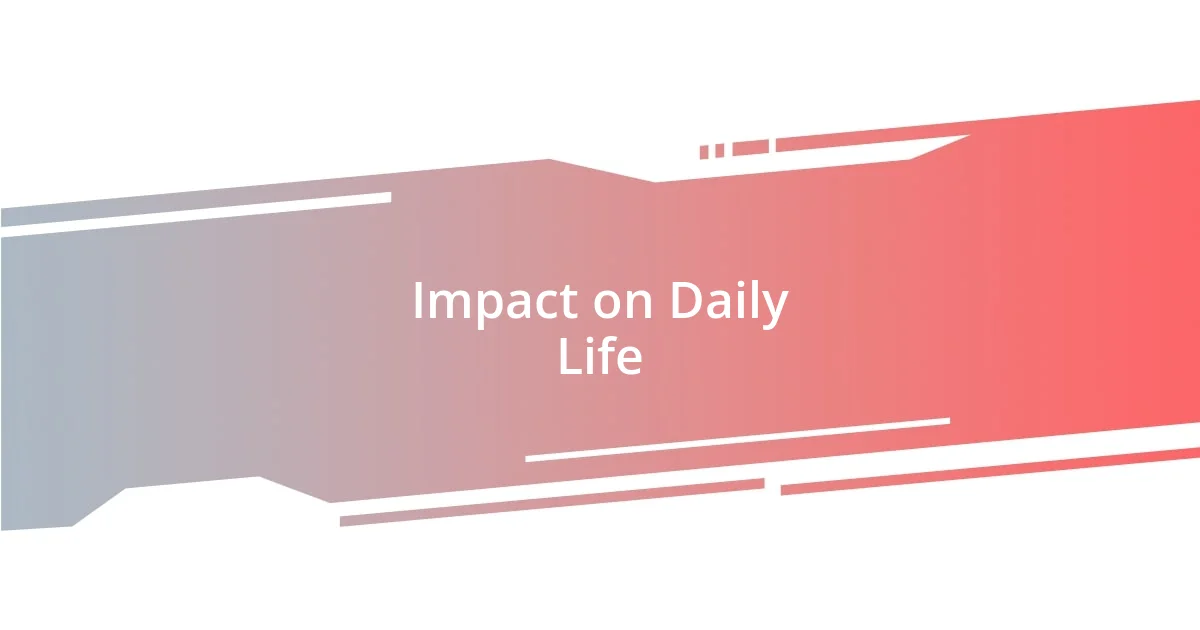
Impact on Daily Life
Living with a genetic condition can turn everyday tasks into profound challenges. For instance, I often find myself considering how my energy levels fluctuate throughout the day. Simple activities like grocery shopping can be daunting, not just physically but mentally as well. I remember once standing in the aisle staring at a shelf of cereal, feeling overwhelmed by choices while also trying to ensure I didn’t exhaust myself too early in my outing.
The routines I follow are often tailored around my condition. I’ve learned to manage my time wisely, rearranging my schedule to incorporate ample rest. In moments of fatigue, I’ve had to prioritize what truly needs to get done, leaving less essential tasks for another day. One particularly enlightening moment was when a friend mentioned how they admired my ability to adapt— it hit me that my struggles had forged a resilience I hadn’t recognized before.
Social interactions also face a significant impact. I often hesitate before accepting invitations, weighing my health against the desire to connect. I once had plans for a weekend gathering but knew I would struggle to keep up. Ultimately, I chose to stay home, only to be surprised by a text from a friend later asking if I was okay. This moment reinforced the idea that, for many with genetic conditions, the burden isn’t just physical— it’s emotional and relational too, as we navigate the expectations of our social lives.
| Aspect of Daily Life | Impact of Genetic Conditions |
|---|---|
| Physical Activities | Often limited, requires careful management of energy and resources. |
| Social Interactions | Frequent hesitance to engage due to health considerations and potential stigma. |
| Emotional Well-being | Struggles with feelings of isolation and the need for understanding in relationships. |
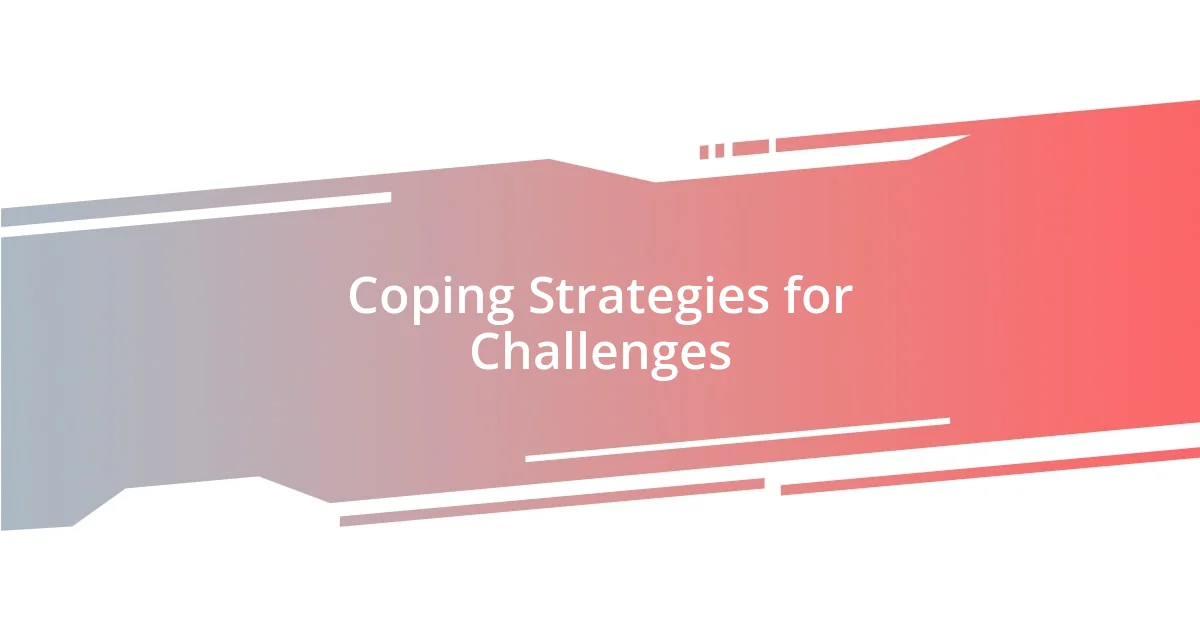
Coping Strategies for Challenges
Navigating challenges often requires me to tap into my own resourcefulness. One strategy I’ve found invaluable is creating lists that outline my daily tasks, breaking them into smaller, manageable parts. I remember a day when I felt particularly overwhelmed by the prospect of cooking dinner while managing fatigue. Instead of letting that daunt me, I broke it down: I focused first on chopping vegetables, then on cooking the rice, treating each step as a mini victory. It’s remarkable how these small wins can lift my spirits when the world feels heavy.
Another coping mechanism I lean on is mindfulness and self-compassion. I’ve started practicing meditation when I feel anxiety creeping in. I recall a time when my body just wasn’t cooperating during a family outing. Instead of sulking, I took a moment to breathe and acknowledge my feelings without judgment. This shift in perspective helped me manage my emotions, allowing me to enjoy the moments with my loved ones, even if I had to participate differently than they did.
Connecting with others who share similar experiences has been a game changer for me as well. Online forums and local support groups have introduced me to people who truly understand my journey. I often think back to a night spent with a few fellow warriors sharing stories and exchanging tips. Hearing their laughter while discussing our unique challenges created an atmosphere of acceptance. How comforting it is to realize I’m not alone in my struggles! Through these connections, I’ve learned that vulnerability can be a strength—this shared understanding builds resilience, something we all need in our daily battles.
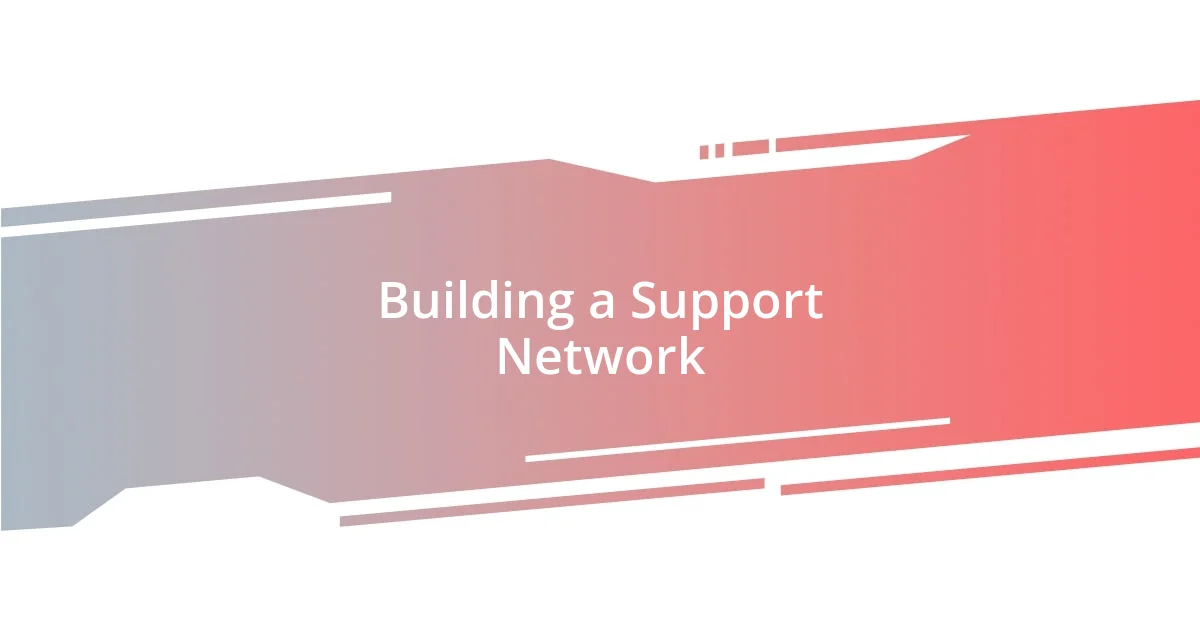
Building a Support Network
Building a support network has been one of the most vital aspects of managing my journey with a genetic condition. I vividly remember the first time I attended a local support group; the warm smiles and shared laughter immediately put me at ease. It struck me how powerful it felt to be in a room filled with individuals who understood my struggles without me needing to explain every detail. Doesn’t it make you wonder how much lighter the load becomes when shared with others?
I’ve also found significant strength in leaning on friends and family. There was a time when I was hesitant to open up about my challenges, afraid it might burden them. But when I finally shared how my condition affects daily life, the response was overwhelmingly supportive. One friend even offered to join me on grocery runs, turning what was once a daunting task into a pleasant outing. How uplifting it is to realize that asking for help can deepen connections rather than weaken them!
In this journey, social media has played an unexpected but supportive role. I often connect with others through online platforms—sharing experiences and advice in real-time. There was a memorable moment when I posted about a particularly tough week, and within a day, I was showered with messages of encouragement and understanding from people I’d never even met. Isn’t it amazing how a simple click can create such a heartfelt community? This interaction reinforced my belief that building a robust support network goes beyond face-to-face conversations; it flourishes in shared digital spaces as well.
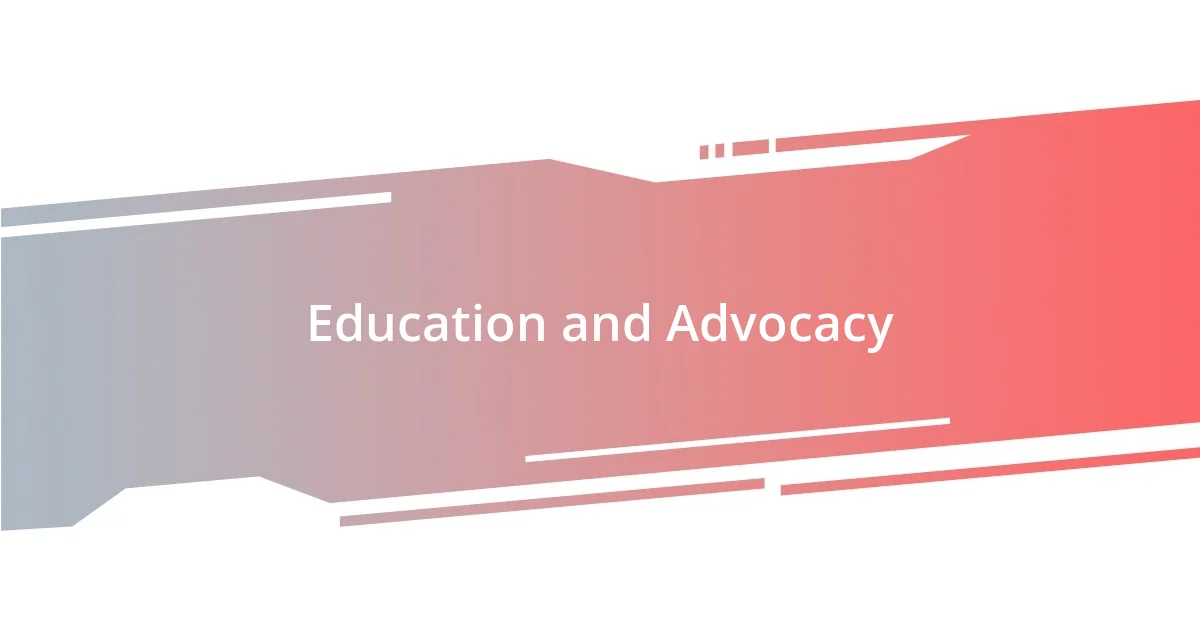
Education and Advocacy
Education has been a powerful tool in my journey with genetic conditions. I recall a moment when I sat in a classroom, absorbing information about my condition that I hadn’t known before. It felt like a light bulb moment—suddenly, I understood my body’s quirks a little better. Have you ever had that feeling? I realized that knowledge not only empowers me but also equips me to advocate for myself, whether it’s asking my doctor the right questions or explaining my needs to an employer.
Advocacy, in my experience, goes hand in hand with education. I remember attending a community health meeting where I shared my story and what living with my condition is truly like. The look of understanding on people’s faces was incredibly rewarding, as if I was providing them a glimpse into a world they had never considered. It made me think about how vital it is to speak up—not just for myself, but for others who may not have a voice. Isn’t it inspiring how sharing our experiences can lead to broader awareness and, ultimately, change?
I often reflect on how crucial being an informed advocate is. There was a time when I felt overwhelmed by medical jargon and treatment options. I decided to spend a weekend researching everything I could find. Not only did it demystify my condition, but it also gave me the confidence to discuss my care more assertively. I still remember the empowerment that surged through me when I approached my doctor with questions and suggestions, turning the roles from passive to active. Isn’t it amazing what knowledge can do for our sense of control and agency in our lives?
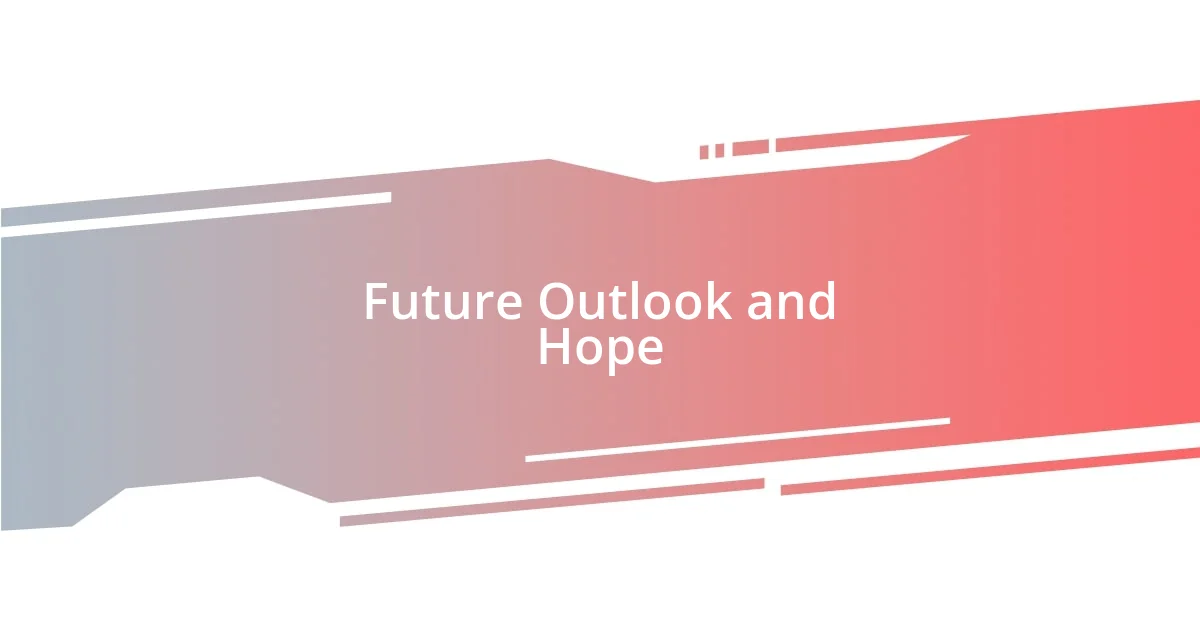
Future Outlook and Hope
Looking ahead, I find a sense of hope blossoming within the ongoing advancements in genetics research. I remember a conversation with a researcher who spoke passionately about the next wave of gene therapies. It sparked an excitement in me—could this be the breakthrough that finally changes the narrative for individuals like us? I can only imagine the incredible possibilities that lie ahead for treatments tailored specifically to our genetic profiles.
I often reflect on the young generation of advocates emerging in this space. Recently, I attended a conference where several teenagers passionately shared their stories. Their bravery and determination filled the room with an electric energy. It made me wonder—how will their voices shape the future of genetic conditions? This new wave of awareness gives me hope that our struggles won’t just be seen as hurdles, but as opportunities for innovation and understanding.
There’s something so powerful about hope. One day, during a particularly rough moment, I stumbled upon a documentary highlighting miraculous treatments that have transformed lives. Watching those success stories allowed a spark of optimism to ignite in me, reminding me that hope is often just a story away. Isn’t it incredible how resilience can shine its light through the darkest times, guiding us to a future where possibilities seem endless?










